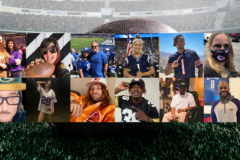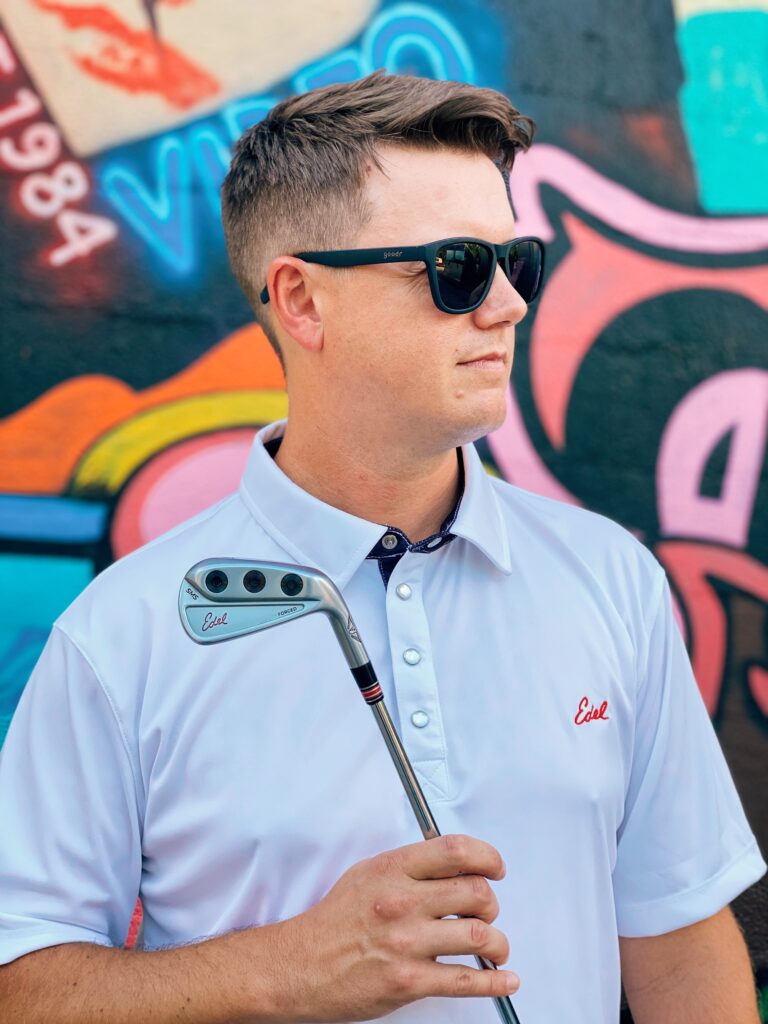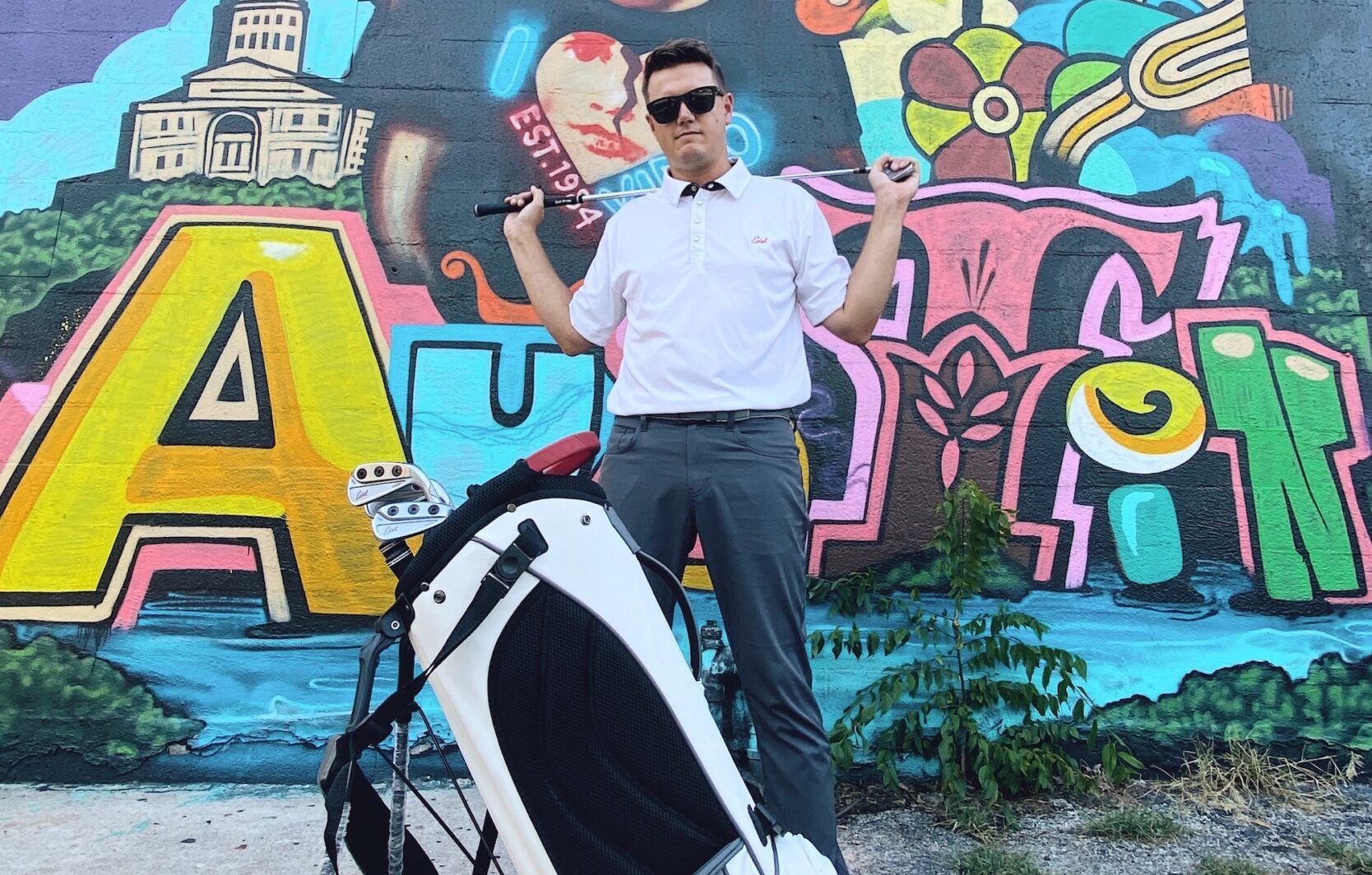Cartel may no longer be the full-time band they were a decade ago, but the Georgia pop-punkers’ shift to part-time status has allowed singer Will Pugh to follow his other lifelong passion on the golf course.
The lifelong golfer went from one of the better-playing rockers on the planet to entering multiple facets of the sport’s industry itself. What began as a hobby of building and custom fitting clubs for himself and his friends quickly turned into a full-time job with Edel Golf — a relatively small brand that sees eye-to-eye with his belief that clubs should be made specifically to fit their users.
SPIN spoke with Pugh via Zoom to hear about balancing his two very different (yet surprisingly connected) passions and how one career opened him up for another.

Also Read
98 Musicians Predict the 2022 NFL Season

SPIN: Obviously there are plenty of musicians who have played golf, but what made you want to turn it into a career?
Will Pugh: I’ve played golf since I was seven. I grew up in a family that played golf, so I’ve always been pretty familiar with it and good at it. I played JV in high school, and I actually quit the golf team to join the band — whatever iteration it was in high school. Then that turned into a full-blown 17-year career doing that. It didn’t really occur to me that I could do something in golf until right around the end of 2019. I started getting into club-fitting and just being a nerd about the gear I was playing with — which isn’t too dissimilar from my attitudes towards music and the gear aspect there. Whenever we started recording, I was very interested in the recording process, because I can plug my guitar in and make it sound good when standing in front of people and playing a show, but how do I get it to sound good when I’m recording it? I dove headfirst into music production in the studio for seven years, so that studio side of things and being very technical and precise with different things led to me going down this rabbit hole with golf clubs and being able to play better. I’m a pretty good player, so I’m always looking for a little bit of an edge to get better. I.was like “OK, let me try my hand at figuring this gear out,” so I went to a club-building school — which is only about five days, nothing insane — but it’s enough that if you know what you’re doing, you can get a pretty good education. Then I started building my own shop at home to be able to work on my golf clubs. Ultimately, I started working on buddies’ golf clubs and clients’ and stuff. It was sort of a seamless transition, but a very long one.
Golf doesn’t feel like the most “rock ‘n roll” sport, but it’s probably the one that the most bands play. How connected do the two worlds feel for you?
Over the years of touring and everything, I’ve met a lot of different club pros and industry guys on the club side of things. I have a buddy who works at a major [equipment manufacturer] that my manager was roommates with, so we got hooked up with some clubs and discounts and stuff like that. So I was already kind of plugged in to a couple of different outlets in the industry, but not necessarily trying to network with them. But it’s interesting because a couple of tour players have told me that all tour players want to be musicians, and all musicians want to be golfers. I think it’s just an escape. You can get on the golf course for four hours and people understand not to bother you, so there’s some peace and quiet to it. I’ve done a lot of songwriting on the golf course just walking around and singing different lyrics in my head, trying to figure certain parts out. It’s just funny how music and golf seem to have this real hand-in-hand thing even though they seem like total opposites. I mean, Alice Cooper is this big shock rock guy, but he’s also a massive golfer.
Is there anything that you learned through golf that you were able to apply to music or vice versa?
More from music into golf, but I guess it could go both ways. I knew real quickly that I wasn’t going to be an elite guitar player — like I don’t have the dexterity or the chops, and I definitely didn’t want to practice that much to get my fingers to do the things that they needed to do. But I was really good at rhythm guitar and making weird chord variations or inversions. My guitar teacher from fifth grade was a jazz guitar player, so he taught me all the crazy seventh chords and power chords. I knew I couldn’t play leads, so I learned to be really good at chord variations that let the melody sit on top. I could make a chord and then make a melody with my mouth as a singer, which was fun and easy to do for me. With golf, it’s a similar thing, in that tempo is a very big deal. Being able to understand how to move your body through the swing — and it’s not just some herky-jerky motion — is very similar to guitar. I taught one of my buddies in Nashville to play golf. He’s an incredible guitar player, and I was trying to teach him the tempo part of it, so I was like “You know when you do one of those big breaks and the downbeat is the end of the chord? Think of the downbeat of the chord as when you hit the ball. When you get up to the top, just try to rake the chord in. You don’t want to go too fast — you have to make it smooth — but at the very end, you give it a little extra, right? Hit the ball like that.”
How do you balance your music career — particularly the return of Cartel — with your golf career?
Well, luckily, my boss at Edel is super cool. When I was going through the interview process, we had some festival shows lined up, and I’m like “Hey man, I don’t want to seem like this weirdo just going for this job, but I’m also in a band. We’re called Cartel. You can look it up. We’ve got a bunch of stuff out there you can check out. People pay us to do things — and I’m not going to not do it — but I’ll make sure it doesn’t interfere with this job.” I wasn’t trying to hide it, but without any context, it sounds different than it is. When he learned about it, he was like “Dude, lean into it. I’ll get you on some golf podcasts, and you can talk about it because that’s super cool.” It also feels kind of similar because Cartel always felt like a little bit of an underdog, and the golf company is really doing things our way and trying to get somewhere in an industry that’s got a lot of big players. It kind of feels like kindred spirits. My boss was super cool when I told him about the tour, which is great because I was very much prepared to say “Sorry guys. We can’t do it. My boss is really not into it.” Instead, I’m just mixing it in. When we get to a city each day, I’ll just run out and see the accounts that I have in those cities and maybe take a couple guys out to play golf or whatever. Plus, it’s a chance to sweeten the pot a little bit with “You guys want to come see a concert? Take your wife out and do something cool? You don’t have to see my band — I don’t care — but I’ll get you and your significant other backstage passes and you’ll look like a hero for a night.
Do you have any words of wisdom for anyone looking to follow your path from the music industry to the golf world?
I think the golf world and the music world are pretty similar from the industry standpoint, where I’m sure any industry person or band that’s been moderately successful and had interactions with the industry at large would understand it. When I was green in like 2006 and meeting all these [music industry] people for the first time, I thought “These are all kingmakers who know everything and know how to do stuff.” Looking back now, I know that literally everyone is just shooting from the hip. No one actually knows what’s going on. You have some new phenomenon take off, and then everybody’s suddenly chasing that dragon. Everything is just an accident that people take credit for. It’s the same thing with golf. People just experiment with things, and they’ll do something and go “Oh shit, that actually worked!” Then everybody thinks they’re a genius, but that’s not how it works. When the Beatles were making Abbey Road, I’m pretty sure they didn’t say “This is going to be the greatest album ever made, and we’re going to inspire literally millions of musicians.” I guarantee you they didn’t point like Babe Ruth and call their shot beforehand. I would just encourage people in both music and golf that as long as you’re coming at it with a pure heart and passion — like you really want to learn and do the best that you can — that’s really all it takes.




